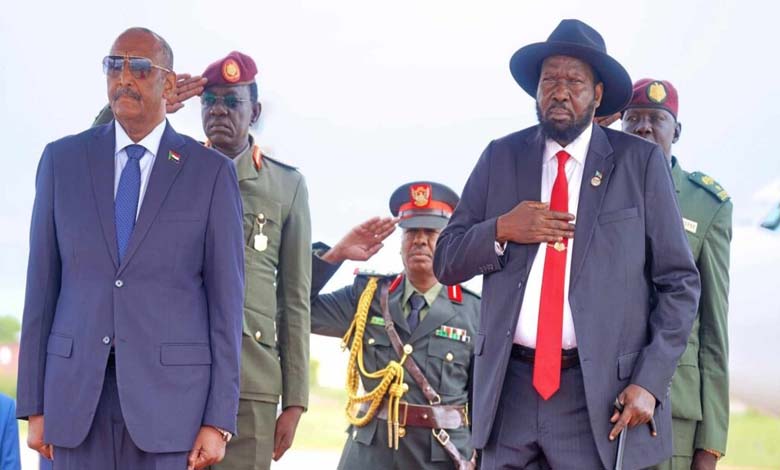Tensions between Khartoum and Juba Following Calls for International Intervention in Sudan

The Sudanese Ministry of Foreign Affairs has accused officials in Juba of supporting retaliatory campaigns against its citizens, following the killing of South Sudanese nationals during a Sudanese army operation in Al Jazirah State.
On Thursday, Khartoum condemned statements made by South Sudanese Foreign Minister Ramadan Jok, who reportedly called for the United Nations and the African Union to intervene in Sudan. Relations between the two countries have deteriorated significantly in recent times, while the ongoing conflict in Sudan has raised fears among neighboring states about its potential consequences and the possibility of it spreading.
-
Sudanese Analyst: Khartoum Caught Between Fire and Famine… Civil War Exacerbates Human and Economic Suffering
-
Sudan: The Muslim Brotherhood Inflames the Situation in Khartoum
In a statement, the Sudanese Ministry of Foreign Affairs declared: “We denounce the remarks made by South Sudanese Foreign Minister Ramadan Mohammed Abdullah Jok in New York, where he unjustifiably called for UN and African Union intervention in Sudan.”
The ministry noted that despite the formation of an investigation committee after recent events in Al Jazirah State (central Sudan), “the city of Juba and other areas in South Sudan have witnessed retaliatory campaigns, including killings, physical assaults, and looting, which have targeted innocent Sudanese citizens.”
-
Dozens of sudanese killed in clashes in Khartoum
-
More than “1000” children recruited by the Sudanese army have been killed in battles in Khartoum
It added that these attacks were “instigated by official South Sudanese leaders, affecting even the Sudanese embassy in Juba and its staff, in what constitutes a serious violation of the Vienna Convention on Diplomatic Relations and all international laws and norms.”
Jok’s position reflects the concerns of Sudan’s neighboring countries regarding the ongoing war, the Sudanese Sovereignty Council’s rejection of peaceful solutions, and its insistence on military action despite its implications for regional stability, especially with the growing z
-
The al-Naseem Hospital in the Oumdurman area of Khartoum is subjected to an aerial attack by the Sudanese army using drones
-
Khartoum rejects the British resolution on Sudan
On January 16, Sudanese Sovereignty Council Chairman Abdel Fattah al-Burhan issued a decision to form an investigation committee to address allegations that members of the army committed violations and killed civilians in villages in Al Jazirah State (central Sudan). The army has regained control of large areas in the state, including its capital, Wad Madani.
Before the formation of this committee, Sudanese civilian and political groups accused army personnel of committing “violations” in Wad Madani and eastern Al Jazirah villages after retaking them, including “killing 13 civilians in the village of Kampo Tayba, some of whom were South Sudanese,” according to local media.
-
Sudan Conflict Claims New Civilian Victims… Bus Station Bombing in Khartoum
-
Erasing Cultural Identity: Sudan’s turmoil targets Khartoum’s Historical Landmarks
On Monday, South Sudan’s police reported that 16 Sudanese citizens were killed during riots the previous week, which were allegedly in response to the killing of South Sudanese nationals in Sudan’s Al Jazirah State.
On January 16, incidents of looting and destruction targeted shops owned by Sudanese nationals in South Sudan, particularly in Juba.
The Sudanese government accuses Juba of supporting the Rapid Support Forces (RSF) by sending fighters, though the South Sudanese government denies these allegations.
-
Sudanese Support Forces Control Um Ruwaba as Fighting Intensifies in Khartoum
-
Sudanese army kills 40 civilians in bombing of market in South Khartoum
In its statement, the Sudanese Ministry of Foreign Affairs asserted that “the Sudanese government has exercised patience regarding the numerous transgressions by South Sudan out of respect for the ties of neighborliness and the historical relations between the two peoples.”
In a direct accusation of South Sudanese authorities supporting the RSF, the Sudanese ministry stated: “Despite documented and proven participation of South Sudanese mercenaries within RSF ranks, and despite sharing the details with the government in Juba, it has failed to take necessary measures to halt the recruitment and dispatch of mercenaries from South Sudan to fight against the Sudanese state and people.”
-
The Economic Situation Collapses in Sudan… War Plunges Khartoum into Major Crises Khartoum has entered a major crisis
-
The Sudanese War… A continuous threat to the medical situation in Khartoum
The ministry emphasized that it “will take appropriate measures to respond to South Sudan’s numerous violations in international and regional forums and will not hesitate to take actions that ensure the protection of its rights and those of its citizens in accordance with international law and treaties.”
Since mid-April 2023, the Sudanese army and the Rapid Support Forces have been engaged in a conflict that has resulted in over 20,000 deaths and nearly 14 million displaced persons and refugees, according to the United Nations and local authorities. A study by American universities estimated the death toll at around 130,000, both directly and indirectly.
-
After the ceasefire ended, clashes resume in Khartoum once again, threatening hopes for calm
-
Civil War – African warnings about the continuation of the conflict in Khartoum
-
The Sudanese situation worsens… Warring parties fight over weapon and fuel depots in Khartoum












